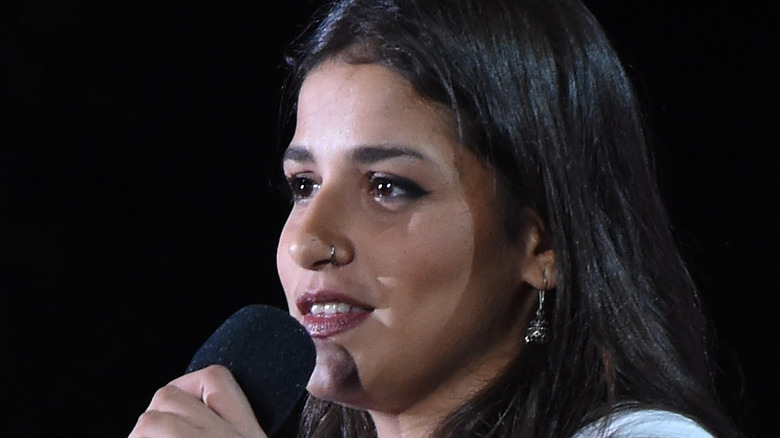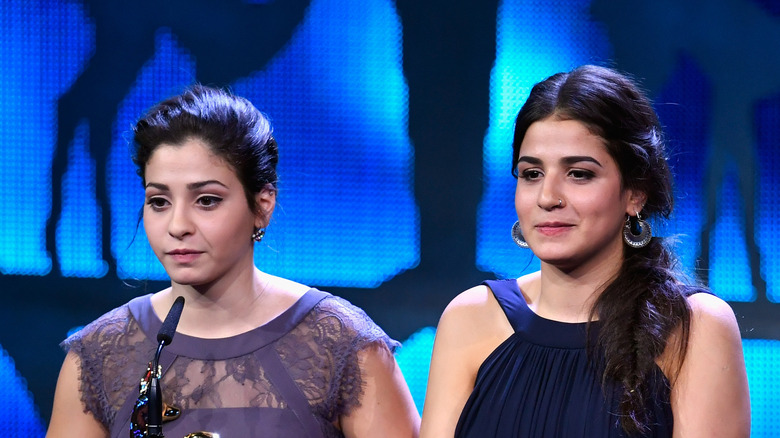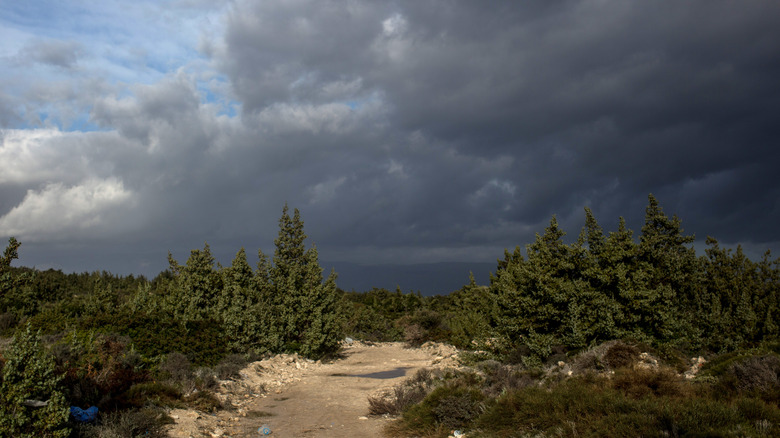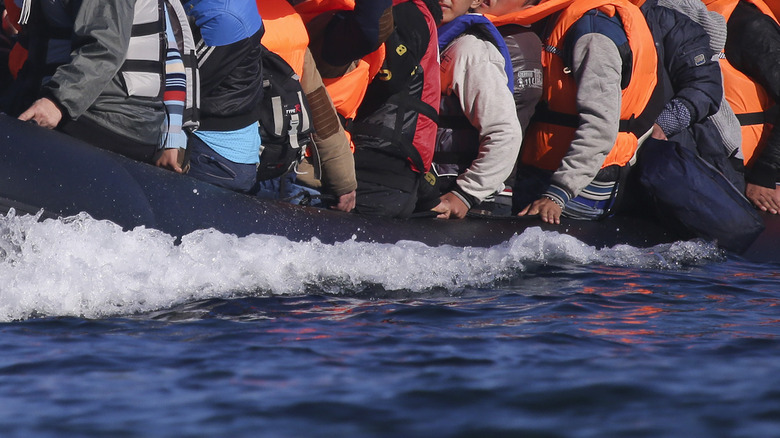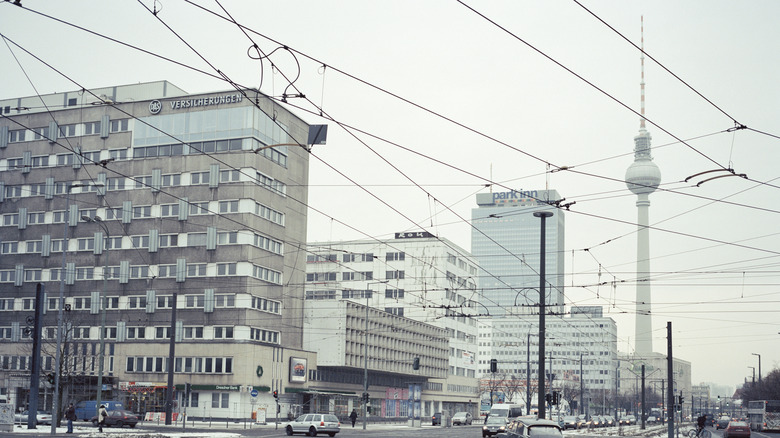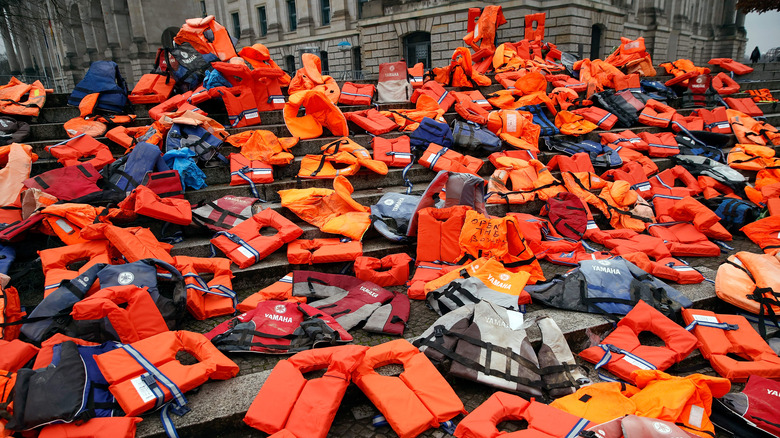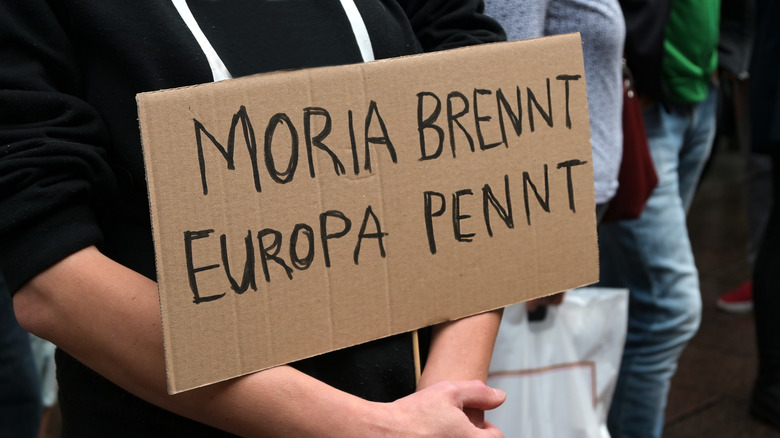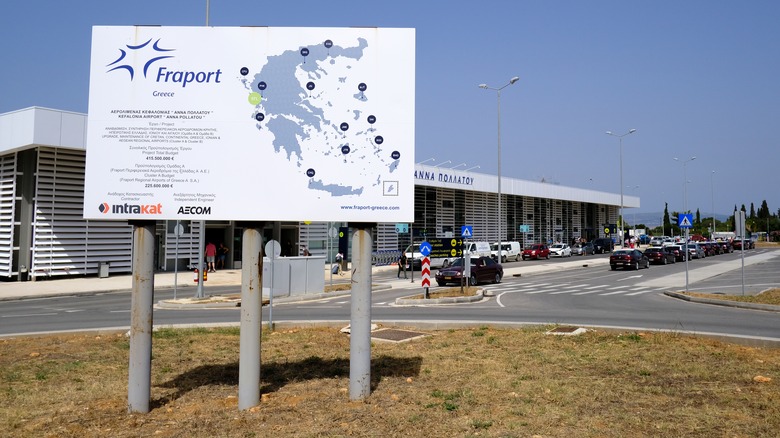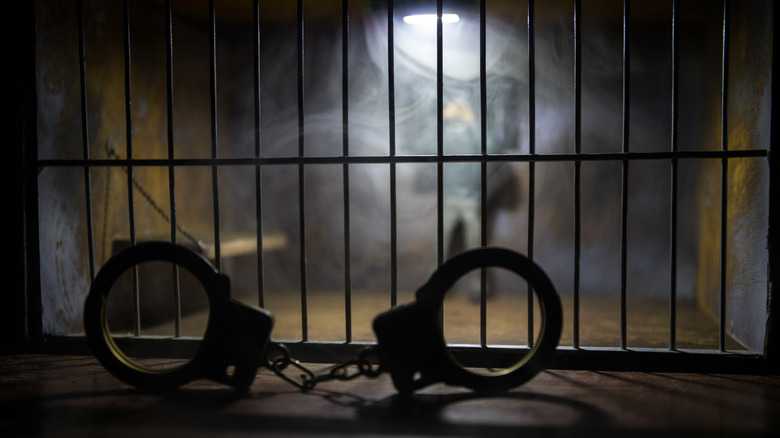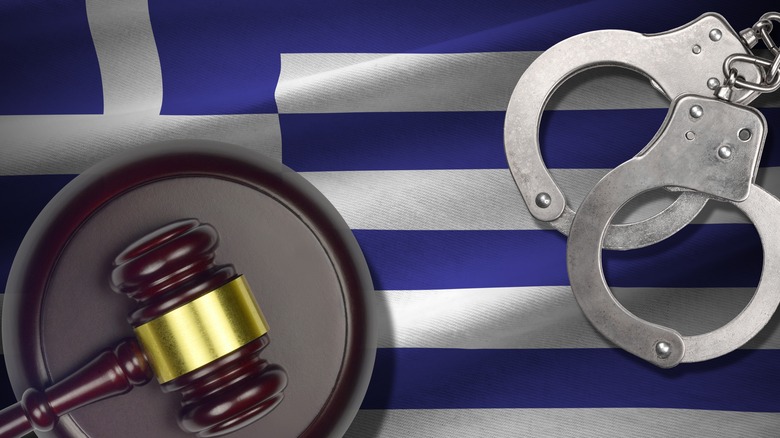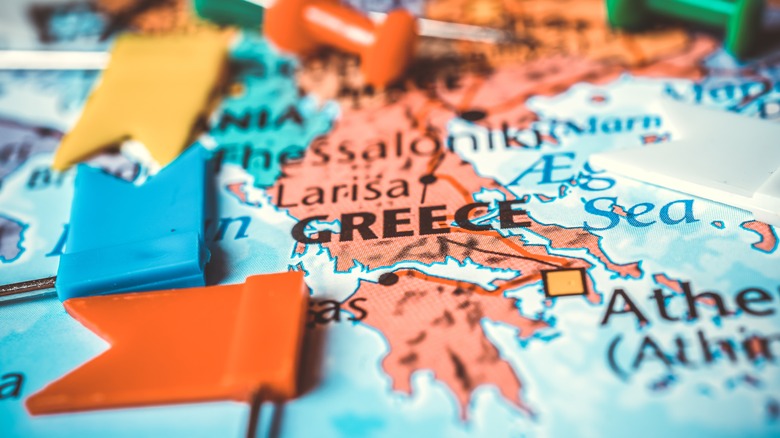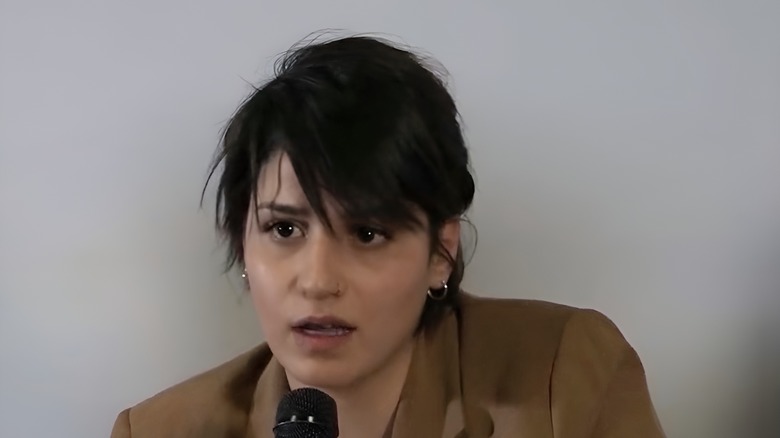The Trial Of Sarah Mardini Explained
In 2018, Greek authorities accused Sarah Mardini of human smuggling, money laundering, and espionage, among other charges. While Mardini challenges the veracity of the accusations, and several human rights organizations have contended that the charges are merely meant to dissuade humanitarian workers from helping displaced people seeking asylum in Greece, the trial resumed in January 2023 (via The New York Times).
During the trial, some of the defendants charged alongside Mardini were set to attend the Lesvos court. But Mardini, who is barred from re-entering Greece, was scheduled to follow the trial's proceedings from her home in Berlin, Germany.
Some human rights organizations argue that if Mardini is found guilty, it could set an incredibly dangerous precedent in terms of how the Greek government treats people who try to help people migrants, refugees, and asylum seekers. As stated by Nils Muiznieks, the European director of Amnesty International, "The Greek government has tried to deter humanitarian action by various means. The outcome of the trial will be an important signal to others doing similar work." This is Sarah Mardini's trial, explained.
Who is Sarah Mardini?
Sarah Mardini was born in Damascus, Syria in 1995 to Mervat and Ezzat Mardini. The oldest of three children, Mardini also has two sisters, Yusra and Shahed Mardini. During her childhood in Syria, Sarah's mother worked as a physiotherapist while her father worked as a swimming coach, as reported by Vogue. Because of her father's work, both Sarah and Yusra began swimming from an early age. An exceptional swimmer, Yusra even went on to compete on the Refugee Olympic Team in the 2016 and 2020 Olympics.
The Cinemaholic reports that when the Syrian Civil War began in 2011, Sarah was in law school while also training as a professional swimmer like her sister Yusra. But within a year, the fighting in Damascus had become so severe that it was too dangerous for the Mardini sisters to get to the swimming pool amidst all the shootings.
In an interview with 1000 Dreams, Sarah states that in addition to losing their family home, the inability to swim was the biggest catalyst in pushing them to flee Syria. "I think that was the main reason that we couldn't go swimming. We couldn't go to school, and the main reason was also losing the home, our home. So that was a decision."
Fleeing the Syrian Civil War
In 2015, both Sarah and Yusra Mardini decided to flee Syria. Neither they nor their family knew where they were going to end up, but Yusra had already stated to her mother that "I'm leaving Syria. If I die, I'm going to die in my wetsuit."
Vogue reports that the Mardini sisters flew to Turkey via Lebanon. After reaching Turkey, they made contact with someone who helps refugees get across borders that brought them to Izmir, Turkey after a 10-hour bus ride. Upon reaching Izmir, the Mardini sisters waited in a forest with other refugees. They spent four days in the forest, with no food and few belongings, uncertain as to when they'd be able to set off in the boat, according to 1000 Dreams.
After four days of waiting, the boat finally set out from the shores of Izmir. There were roughly 18 people on the boat in addition to the sisters, despite the fact that it was only meant to hold at most seven people, per the International Olympic Committee. The voyage was meant to take 45 minutes, but within 15 to 20 minutes into their journey, the boat's engine sputtered out and failed.
Saving the refugee boat
As the engine failed and the boat lost its momentum, it started sinking into the Aegean Sea between Turkey and Greece. As soon as they realized that the boat was sinking, the Mardini sisters jumped into the water and began pushing and pulling the boat through the sea. In addition to being an exceptional swimmer, Sarah Mardini is also a certified lifeguard and had no second thoughts about jumping into the water to help save the people in the boat. "This is our job. It's just natural for us to do this," per UNHCR.
For over three-and-a-half hours, the Mardini sisters struggled to get the boat of refugees to the shores of the Greek island Lesvos as the waves kept crashing into them. "That was the hardest part — the stinging of the salt water. But what were we going to do? Let everyone drown? We were pulling and swimming for their lives," Yusra Mardini told Vogue. Thankfully, everyone managed to survive the harrowing journey with no significant injuries, and they made it to the north shore of Lesvos on August 18, 2015.
Securing asylum in Germany
After reaching Lesvos, Greece, the Mardini sisters took a ferry to Athens and from there traveled by land through Europe. According to 1000 Dreams, the Mardini sisters alternated traveling by train, bus, and foot through North Macedonia, Serbia, Hungary, Austria, and Germany. The journey took nearly a month.
When the Mardini sisters reached Berlin, Germany, they decided it would be their final destination. In Germany, they were granted political asylum and they were able to begin rebuilding their lives, reports Middle East Eye. "We were lucky that we are here, like, why would we leave? And yeah, we were living [in Berlin] since then," Sarah Mardini told 1000 Dreams.
While living in the refugee center in Berlin, the Mardini sisters met a swim coach named Sven Spannenkrebs, who allowed the sisters to train at a nearby pool, as reported by Women's Health Magazine. Unfortunately, Sarah was forced to stop swimming professionally, as noted by UNHCR. Pulling everyone to safety unharmed through the Aegean Sea came with a cost: Sarah's shoulder, which had suffered injuries in the past, sustained enough damage to prevent her from swimming competitively ever again. While Yusra Mardini trained at the swim club, and eventually went on to compete in the 2016 Olympics in Rio de Janeiro, Sarah had trouble settling in Berlin, writes The New Humanitarian. "I missed Syria and Damascus and just this warmness in everything," Sarah said.
Working with refugees
In 2016, Sarah Mardini received a message from a volunteer at the Emergency Response Centre International (ERCI), inviting her to visit other refugees in Lesvos that were inspired by her and her sister's journey. After attending the Olympics in Rio de Janeiro, Brazil to support her sister Yusra Mardini, Sarah traveled back to Lesvos in August 2016, writes The New Humanitarian.
In Lesvos, it didn't take long before Sarah was faced with a similar experience to one she'd survived just a year earlier — but this time she was on the other side. On her very first night volunteering in Lesvos, the ERCI spotted a boat of refugees approaching the shores, and before long Sarah was in the water helping people get to safety. The role reversal struck Sarah: "I felt it was unfair that they were on a refugee boat and I'm a rescuer."
Sarah started spending more and more time volunteering in Lesvos. "Greece felt like my second home after Syria. I just loved the warmth of the people in Lesbos and knew everybody there, from the locals to the refugees. So I had to return," she told the Middle East Eye. Initially, she used her swimming skills to get refugees to shore safely. But soon, Sarah was spending the majority of her time as a translator in the Moria refugee camp in Lesvos.
Nine months in Lesvos
Initially, Sarah Mardini traveled back and forth between Berlin, Germany, and Lesvos, Greece. But by 2017, Mardini decided to take a break from her politics and economics studies at Bard College Berlin and instead focus the majority of her energy on her work with displaced people in the Moria camp. According to The New European, when the Mardini sisters first arrived in Lesvos, few people would sell them anything, even water. This experience remained with Mardini as she worked to ensure that people arriving on the island as refugees would have access to the things she didn't.
The New Humanitarian reports that the conditions at the Moria camp in Lesvos were especially dire. The camp housed almost three times as many people as it was intended to hold and there were few resources when it came to food or sanitation. Mardini described her work at the camp as "fighting the fire. You have people who are dying and living in a four-metre tent with seven relatives. They have limited access to water. Hygiene is zero. Privacy is zero. Security: zero. Children's rights: zero. Human rights: zero... You feel useless. You feel very useless."
Although Mardini had spent most of the previous two years traveling back and forth between Berlin and Lesvos, by the time she made moves to leave and return to her studies in Berlin in August 2018, she'd been volunteering in Lesvos for almost nine straight months.
Arrested in the airport
On August 21, 2018, Sarah Mardini went to the Mytilene International Airport in Lesvos, Greece to check in for her flight back to Berlin, Germany. She'd made the trip back and forth several times uneventfully already since living in Germany and there was little reason to believe that this trip back would be any different. But this time, she was surrounded by Greek police officers as she entered the airport and was arrested.
Middle East Eye reports that this wasn't the first time that Mardini was targeted by the Greek police. No more than a few weeks before, Mardini had been detained along with another volunteer named Sean Binder. At one point, the Greek police even searched through their homes and confiscated their electronics.
After Mardini's arrest at the airport, Binder went to the police station to check on her. There, he was promptly arrested as well. Mardini and Binder also weren't the only Emergency Response Centre International (ERCI) volunteers who were arrested and detained. Nassos Karakitsos and Panos Moraitis were also held in pre-trial detention in 2018. And according to Human Rights Watch, they were all subsequently held in pre-trial detention for 106 days by the Greek police.
106 days in pre-trial detention
After being arrested on August 21, 2018, Sarah Mardini was held with other humanitarian volunteers for over 100 days in pre-trial detention. The New York Times reports that along with 29 other people, Mardini was accused of being involved in "an organized criminal network that systematically facilitated the illegal entry of foreigners." The Greek authorities claimed that the humanitarian work that Mardini and Emergency Response Centre International (ERCI) did was merely a front for a criminal network of human trafficking.
In Greece, authorities are legally allowed to keep people in pre-trial detention for up to 18 months. But after a judge granted a petition to allow them to be released on bail, Mardini and Sean Binder were released on $5,655 bail in December 2018, according to Middle East Eye. Mardini states that the experience of being detained for over three months continues to affect her. "You know this feeling of having many needles poking your skin? I always feel like I'm being hurt by them constantly. It's been a really tough and emotional period for me, and even my loved ones are suffering, looking at my pain."
Facing up to 25 years in prison
The accusations against Sarah Mardini and Emergency Response Centre International (ERCI) volunteers are varied, ranging from human smuggling to espionage. Al Jazeera reports that the misdemeanor accusations relating to espionage carry a prison sentence of up to eight years, while the felony accusations for smuggling and money laundering carry a maximum of 25 years.
Police claim Mardini's work in the ERCI was human trafficking in "violation of the state's Migration Code," per The New York Times. The espionage charge is allegedly based on communications made with the coast guard and a WhatsApp thread the ERCI volunteers used.
Human Rights Watch contends that after examining the police reports and court documents, the charges against Mardini, Sean Binder, and the other humanitarian volunteers are completely "baseless" and are instead intended to harass humanitarian volunteers and discourage anyone else from helping people who are migrants, refugees, and asylum seekers. Bill Van Esveld, senior children's rights researcher at HRW, insists (via The New York Times) that "You don't have to dig very far before it starts to look really, really abusive."
Barred from entering Greece
After being released on bail, both Sarah Mardini and Sean Binder left Greece. In August 2021, they learned that at least one trial against them and the other humanitarian volunteers was going to move forward. According to The New York Times, the trials against Mardini and the humanitarian volunteers are to be split between their misdemeanor charges and their to-be-determined felony charges due to the fact that the statute of limitations for conducting investigations and charging misdemeanors is five years. Because felonies can be investigated for up to 15 years, the felony charges are still pending.
While Binder was able to return to Greece for the start of the trial in November 2021, Mardini has been unable to attend any of the trial proceedings due to the fact that she is barred from re-entering Greece. According to The Guardian, this is especially ironic considering that Mardini was held in pre-trial detention because she was considered to be a flight risk, but now she's forced to follow the trial from Germany because she's not allowed to enter Greece for her own trial.
Giorgos Kosmopoulos, a senior campaigner for Amnesty International, stated (per Reuters), "It's mind boggling why someone cannot attend their own trial." In addition, Arab News notes that this violates European and Greek laws, which ensure the "right to be present at one's own trial."
Where the trial stands
The trial proceedings regarding the misdemeanor charges against Sarah Mardini and the other humanitarian workers began in November 2021 but only lasted a few hours before the court referred the case to the Appeals Court of the Northern Aegean. According to Human Rights Watch, this was due to the fact that the prosecution "had filed the case before the wrong court, which held that it was not competent to try the case."
France24 reports that the trial was delayed due to various procedural issues until it finally resumed on January 10, 2023. Bill Van Esveld at HRW maintains (via The New York Times) that these charges and ongoing trials against Mardini and the Emergency Response Centre International (ERCI) are simply a way for Greek authorities to suppress humanitarian assistance for displaced people: "This is about a bigger objective. Absolutely destroy the NGOs and sow the ground with salt." ERCI has since ceased operations, and as a result, there were no active search-and-rescue organizations in Lesvos as of December 2022, HRW reports.
This isn't the first time activists have argued Greece has charged humanitarian volunteers in an attempt to suppress humanitarian aid. And Middle East Eye reports that between 2015 and 2018, the number of people who received criminal charges for their humanitarian work rose from 10 to 104 people. Per Mardini's lawyer Zacharias Kesses, "When Greece began dealing with the refugee crisis, the government also began threatening everyone who showed solidarity with asylum seekers."
